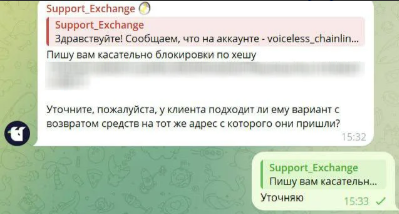А highly qualified specialist who combines deep expertise in two strategically important areas: the cryptocurrency industry and international corporate law. In the field of blockchain technologies and cryptocurrencies, with over five years of practical experience, he specializes in issues of unlocking cryptocurrencies, cryptographic security, tokenization of business processes, and conducting investigations related to cryptocurrency transactions.
The client contacted our legal team after 0.7 Bitcoin (equivalent to approximately $65,000 at the current exchange rate) was frozen during an attempt to exchange it for the USDT stablecoin via a specialized online crypto exchanger.
The situation unfolded in a typical manner for cryptocurrency transactions: the client received Bitcoin into their personal wallet and decided to convert it using a reputable exchange platform offering a favorable rate and promised processing speed. However, immediately after the transfer, the client was notified that the transaction had been temporarily frozen.
The platform explained that it had initiated internal verification procedures in accordance with AML/CTF (Anti-Money Laundering / Counter-Terrorist Financing) regulations. These checks are usually triggered when certain risk indicators are detected — such as large transaction amounts, unusual user behavior, or funds originating from wallets already under monitoring.
The exchange service issued a list of requirements to the client:
- provide information about employment or professional status;
- disclose the sources of income used to build the crypto portfolio;
- submit a complete transaction history leading up to the receipt of funds in the wallet;
- explain the purpose of acquiring and planned use of the crypto assets;
- submit supporting documents: bank statements, tax returns, contracts, etc.
The situation was further complicated by the exchanger’s demand to undergo KYC verification not only by the client, but also by the sender of the cryptocurrency that had been received. In many cases, this is technically or legally impossible — especially if intermediaries were involved or the transfer was made anonymously.
What is AML/CTF and Why Does It Matter?
AML (Anti-Money Laundering) and CTF (Counter-Terrorist Financing) are international regulatory frameworks that require crypto platforms and financial services to identify and block suspicious activity. In compliance with these standards, platforms have the authority to suspend transactions until user identity and the source of funds have been verified.
Such incidents are becoming more frequent due to increasing regulatory pressure on the crypto market worldwide, especially following high-profile scandals and misuse of digital assets.
How Did We Help the Client?
Our legal team quickly took control of the situation. We conducted a legal assessment of the case, reviewed the exchange’s terms of service, and developed an effective response strategy.
Here’s what we did:
- We prepared a comprehensive documentation package, including:
- full client profile (profession, employer, country of tax residence);
- proof of lawful income origin (bank statements, payment instructions, contracts with partners, etc.);
- chronological breakdown of previous transactions — the path of each Bitcoin to the wallet;
- explanation of the transaction's purpose and planned use of funds (e.g., property purchase, investment in business).
- Established direct communication with the platform’s support and security team to expedite document review and approval.
- Prepared a legal position outlining why the freeze was unjustified and the risks of unlawfully withholding client assets.
- Negotiated alternative verification options for the sender, with respect for privacy and technical limitations.
Result
Just three business days after the client reached out, all submitted documents were accepted, the legitimacy of funds confirmed, and the transaction was fully unfrozen by the exchange. The client regained access to their 0.7 BTC and completed the exchange to USDT without further obstacles.
This case highlights the importance of having professional legal support when dealing with cryptocurrency platforms — especially in cases involving frozen funds. Thanks to our in-depth understanding of AML/CTF compliance, transaction verification protocols, and legal processes, we successfully protected our client’s rights and avoided long delays or asset loss.
🔹 Working with crypto and need legal guidance or protection?
Contact us — we’ll ensure your assets and operations are fully secured.



































